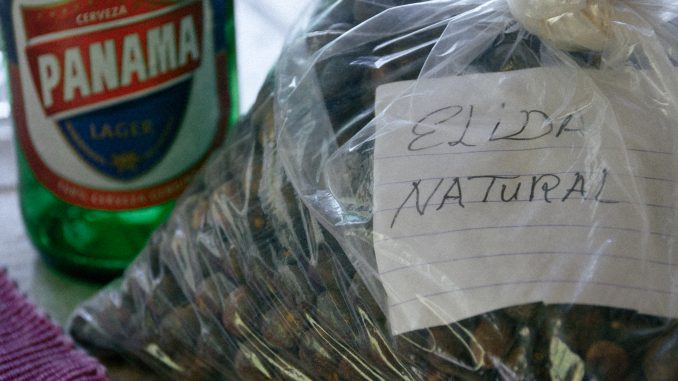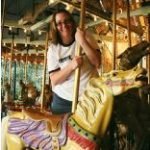
We can’t say we were that surprised to hear about our friends at Verve Coffee Roasters winning big at this year’s Good Food Awards. I mean, c’mon: The Santa Cruz and L.A.-based company has been buying and roasting some of the best coffees in the world for quite a few years now. And this is hardly Verve’s first win at the Good Food Awards, which this year selected only 24 coffees nationwide as being the best of the best as far as quality and leadership in their communities.
So while we weren’t surprised, we were still totally excited. Why? The coffee, of course! Since the Good Food Awards winners were announced January 8, it seems we can’t turn around (virtually) on social media without reading about someone having an awesome experience with the Elida Estate Green-Tip Gesha that nabbed Verve such a high honor. And this is hardly the first we’ve heard of Verve’s close relationship with Elida Estate ”the Cali co. has been working with this Panamanian superstar farm since 2008.
If you’re lucky enough to have access to this North American exclusive release of the Good Food Award-winning Elida Estate Green-Tip Gesha, you might want to brew up a cup and sit down to read this little interview we did with Colby Barr at Verve about the company’s work with Elida over the years, leading up to this win. If you don’t have any of this magical coffee at arm’s length, however, you can still enjoy the story. And then you can pop over to Verve’s online store to buy yourself some of it. Hurry though ”as all of the best things, this coffee is really limited, and will disappear fast.
Sarah Allen: When did Verve first begin a relationship with Elida, and how did it come about?
Colby Barr: We first discovered Elida the way we love discovering coffees, which was during a blind tasting. There were around 80 coffees from Costa Rica and Panama that had made their way to California for a cupping and the coffee that stood out the most for me and I fell in love with that day was from the Elida Estate. From there, we made contact through the supply chain eventually landing at Wilford Lamastus of Elida Estate, buying the single lot of coffee.
The following Spring, 2008, I flew to Costa Rica on my first trip to origin and then hopped a bus to Panama. There in the idyllic refuge of Boquete I met Wilford’s father, Thatcher, who was born on the farm and who spends every day there. We toured the farm in his 1950s four-wheel drive, ate tamarillos, and talked about the history of the farm and how it came to be. We really hit it off talking about farming (since I grew up on a farm, myself), and to this day, every time I visit Boquete, Thatcher has a bag of fruit from his farm for me to take. It is also our very first (what we call) Farmlevel relationship.
SA: How has the farm grown and changed since then?
CB: Since my first visit, the biggest change that has occurred on the farm has been the “coming of age” of their Gesha seedlings. This variety of coffee they planted in a few parts of the farm including the very highest section above the highest-grown Catuai. Somehow the Gesha is able to grow in these highest elevations where the Catuai cannot. The Lamastus family has also, since that first visit, opened a coffeehouse of their own (named Bajareque – after the daily, afternoon mist that forms in Boquete) in Old Quarter of Panama City, giving them a direct connection to the consuming public. This access to coffee-drinkers, I’m sure, has changed the way they view the coffees they produce.
SA: Why do you feel this is such a remarkable coffee?
CB: I think this coffee is one of the (if not ‘the’) very finest I’ve ever tasted, from anywhere.
The Gesha cultivar is notably remarkable, and has proven to shine in this micro region of Boquete, Panama. This specific lot we buy is the selection of only the plants that have new growth with green tips as opposed to bronze. This is a common indentifiable difference between various cultivars and in the case of this coffee, seems to be a mutation of what is a very genetically unstable variety. That said, we found the green-tipped plants to produce a far superior cup to the bronze-tipped, with intense vibrancy and clarity. I call it the HD version.
Location, location, location. Even within Boquete, this coffee grows atop one the highest farms, and one that is very near the continental divide. This location is affected everyday by the “Bajareque”, which is a daily mist that arrives in the afternoons as the cool Pacific air mass collides with the warm Caribbean air mass through convective lift. This creates a very unique microclimate not seen anywhere else in the world. Add to that the coffee growing along the hillside of ancient volcano in beautiful, deep soil, just below a National Preserve that safeguards incredible biodiversity. The farm also faces Southeast allowing amazing sunlight exposure. All of this adds up to an incredible site.
Farming-wise, they are now a 4th generation coffee family that will have been farming this location for 100 years in 2018. They’re truly passionate about producing the best coffee possible and it shows.
SA: How much of the Green-Tip Gesha is available right now?
CB: It is very limited. This being the third year of harvest, there were around 900lbs produced. We buy a third of the coffee, splitting it between us, Kentaro Maruyama of Japan, and the Lamastus family themselves. We’re proud to have been buying this coffee since it’s first harvest and to be an exclusive partner with them. It is one of our most important coffees and symbolic of what we hope to achieve through our Farmlevel relationships.




